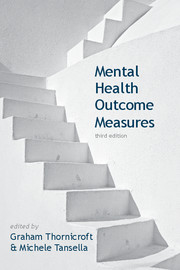Book contents
- Frontmatter
- Contents
- List of tables, boxes and figures
- List of contributors
- Foreword
- Foreword
- Preface: an evolving perspective of mental health outcome measures
- Part I Methodological issues
- Part II Domains of outcome measurement
- Part III Symptom severity outcome measures
- Part IV International approaches to outcome assessment
- 17 Psychiatric assessment instruments developed by the World Health Organization
- 18 Measuring outcomes in mental health: implications for policy
- 19 Outcome measures for the treatment of depression in primary care
- Index
18 - Measuring outcomes in mental health: implications for policy
from Part IV - International approaches to outcome assessment
Published online by Cambridge University Press: 02 January 2018
- Frontmatter
- Contents
- List of tables, boxes and figures
- List of contributors
- Foreword
- Foreword
- Preface: an evolving perspective of mental health outcome measures
- Part I Methodological issues
- Part II Domains of outcome measurement
- Part III Symptom severity outcome measures
- Part IV International approaches to outcome assessment
- 17 Psychiatric assessment instruments developed by the World Health Organization
- 18 Measuring outcomes in mental health: implications for policy
- 19 Outcome measures for the treatment of depression in primary care
- Index
Summary
The activities and purposes of mental health services can be broadly described under four broad headings: needs assessment, inputs, processes and outcomes. During the twentieth century, the focus of service development and evaluation was largely on input and process variables, while use of outcome measures was seen as too difficult, and it was not until the 1990s that efforts were made to introduce systematic thinking about needs assessment and the measurement of outcomes (Jenkins, 1990, 1994). The strength of this book is that it illuminates the increasing number of possibilities to use outcome indicators as the main point of reference for measuring cost-effectiveness.
The approach that uses inputs as measures of service adequacy has historically focused on the number of beds available, the type and ranges of buildings and places that are provided, the numbers of staff of different disciplines and their levels of training and the amount of money injected into the service. Although this information is vital for assessing the performance of a mental health service, it is a one-sided approach. Such information may be entirely misleading if the investment, described in these terms, produces no actual benefits to patients. The input approach on its own, although frequently used and administratively convenient, can give no indication about whether services are actually achieving their goals.
The second and most common approach to assessing the performance of a mental health system is to use process measures. Examples of this approach are the determination of length of stay in hospital, bed occupancy rates, staffing levels, staff turnover rates, and the number and duration of community contacts for home treatment services. Again, this information is vital for understanding the dynamic way in which a variety of services operate, how the physical and human resource infrastructures are deployed in practice, and the distribution of these resources in different geographical and administrative sectors. This approach is the focus of performance management, which is increasingly emphasised as health services are run more and more on corporate lines. However, this can be compared to a detailed description of the functioning of an ocean liner without any reference to whether the ship is sailing in the right direction. Auditing provides service process information, and service commissioning and the management of services are often based on such process information.
- Type
- Chapter
- Information
- Mental Health Outcome Measures , pp. 313 - 318Publisher: Royal College of PsychiatristsPrint publication year: 2010

